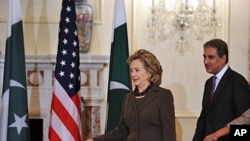The Obama administration pledged Friday to raise its military aid to Pakistan to $2 billion a year - a total increase of $10 billion over five years - to help the country fight extremism. Officials at the State Department say aid will be denied to any Pakistani army units linked to human rights abuses.
The aid pledge, announced by Secretary of State Hillary Clinton, provides a long-term U.S. security commitment along the lines of the five-year, $7.5 billion civilian aid package for Pakistan approved by Congress last year.
Clinton said the Obama administration will ask Congress for $2 billion in military aid for Pakistan for each year from 2012 to 2016.
The yearly pledges constitute an increase in the roughly $1.5 billion in annual military aid provided in recent years, and give Pakistan an assurance of continuity in U.S. support.
Addressing a plenary meeting capping a three-day bilateral strategic dialogue, Clinton said the United States has full confidence in Pakistan's commitment to the anti-terrorist fight:
"I want to say publicly what many of us have said privately: the United States has no stronger partner when it comes to counter-terrorism efforts against the extremists who threaten us both than Pakistan," said Hillary Clinton. "We recognize and appreciate the sacrifice and service that the men and women, particularly the soldiers of the military in Pakistan, have made in order to restore order and go after those who threaten the very institutions of the state of Pakistan."
U.S. officials in recent days have given a mixed picture of Pakistan's anti-terrorism efforts, crediting Islamabad with strides against factions linked to al-Qaida but faulting its efforts against groups fighting NATO forces in Afghanistan that operate from Pakistani border areas.
In his comments, at the plenary meeting of the U.S.-Pakistan Strategic Dialogue, Pakistani Foreign Minister Shah Mehmood Qureshi expressed irritation over what he said are U.S. insinuations that Pakistan's effort against extremism is lacking.
"Nearly 7,000 of our valiant law-enforcement officials have perished in this fight - more than the combined loss of lives of NATO forces in Afghanistan," said Qureshi. "Nonetheless, it unfortunately seems easy to dismiss Pakistan's contributions and sacrifices. There are still tongue-in-cheek comments, even in this capital, about Pakistan's heart not really being in this fight. We do not know what greater evidence to offer than the blood of our people."
Despite the new U.S. commitment, the State Department confirmed press reports Friday that in line with an act of Congress, U.S. aid is being denied to several Pakistani army units linked to human rights violations.
State Department Spokesman P.J. Crowley said the aid curbs under the 1997 Leahy Amendment have been in effect for some time, and are not related to a recent video said to show Pakistani soldiers executing a group of prisoners.
"We have been following the law all along and as we have developed our relations with Pakistan we have been in full compliance with the Leahy Amendment," said P.J. Crowley. "Where we have had human rights concerns, we have not supported particular units. That is fully in accordance with the law. So for those units we are supporting, we are satisfied that these units do not have human rights concerns."
Leahy amendment restrictions have been applied in the past to Indonesian and Colombian military units. Crowley said the fact some Pakistani units are subject to the ban should not affect Congressional support for aid to Pakistan.




